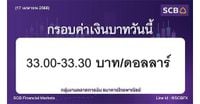On April 17, 2025, the Thai financial market is experiencing a wave of fluctuations, primarily influenced by international trade dynamics and domestic economic policies. The SCB Financial Markets reported that the Thai baht is trading within a range of 33.00 to 33.30 baht per dollar, reflecting its sensitivity to the U.S. dollar's performance. The dollar has weakened recently, which has provided some support for the baht, but concerns linger regarding potential depreciation due to China's reopening and its impact on Thai exports.
Mr. Jerome Powell, the Chairman of the U.S. Federal Reserve, emphasized the importance of long-term inflation expectations maintaining stability during a recent address at the Economic Club of Chicago. His remarks have raised concerns among investors about the Fed's future monetary policy, particularly as they relate to Trump's aggressive tax policies. Powell noted that these policies could lead to higher inflation and a slowdown in economic growth, creating a challenging environment for the Fed.
In the midst of these developments, the Thai stock market is projected to move sideways with a slight upward trend, fluctuating between 1,120 and 1,150 points. Mr. Wijit Arayaphisit, a strategist at BLS Securities, has indicated that the market remains volatile, particularly in light of ongoing discussions between the U.S. and China regarding trade tariffs. Although there are signals of potential negotiations, the conditions required for a successful agreement appear complex.
China's willingness to engage in trade discussions has sparked optimism, as the country is seeking to address several key issues, including respect for its sovereignty and discussions surrounding Taiwan. However, the intricacies involved in these negotiations suggest that significant challenges remain. The S&P 500 index saw a decline of 2.2% recently, reflecting broader concerns about asset market performance.
Despite these uncertainties, there is a silver lining for Thailand. The U.S. Treasury Secretary has identified Thailand as one of 14 countries likely to successfully engage in trade negotiations with the United States. This development is viewed as a potential buffer against market downturns, with analysts predicting that the SET index may not fall below the critical support level of 1,120 points.
Market analysts are recommending a cautious approach, suggesting that investors focus on sectors poised for recovery. Specifically, the leasing sector is expected to grow by 4% month-over-month, driven by increased confidence in the real estate market attributed to relaxed Chinese import policies. Companies such as SGC are being highlighted for their strong performance, with a target price set at 1.40 baht, bolstered by a projected profit of 99 million baht for the first quarter of 2025, marking a remarkable 66% increase from the previous quarter and a staggering 452% increase year-over-year.
Additionally, the Thai stock market is seeing a positive influx of foreign capital, with recent purchases of Thai bonds amounting to 13 billion baht, marking the highest inflow since August 2024. This trend is expected to continue, with further investments in stocks and the long-term Thai futures exchange (TFEX) positions, contributing to a more favorable market outlook.
In terms of sector performance, energy stocks are anticipated to thrive, particularly those related to oil, as crude oil prices have risen by an average of 1.8% due to concerns surrounding supply disruptions following new U.S. sanctions on Iranian oil exports. The appreciation of the baht is also expected to benefit energy companies such as PTT and PTTEP, alongside digital technology firms like ADVANC, TRUE, OR, and CPALL, which are gaining traction in the evolving market landscape.
As the day progresses, market sentiment will be closely tied to the outcome of ongoing discussions between China and the United States, as well as the Fed's stance on interest rates. Investors are advised to remain vigilant and consider the potential impacts of these developments on their portfolios. The Thai stock market's ability to navigate these turbulent waters will depend significantly on external economic factors and internal policy responses.
In summary, the Thai financial market is at a crossroads, grappling with the implications of global trade tensions and domestic economic policies. While challenges persist, there are also opportunities for growth in sectors that are adapting to the changing landscape. Investors are encouraged to stay informed and strategically position themselves to capitalize on the evolving market dynamics.






